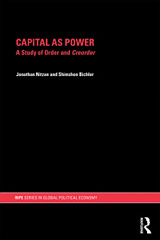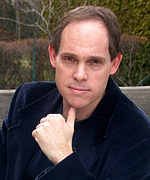
| More News | Book launch and seminar on Capital as Power
on Monday Conventional theories of capitalism are mired in a deep crisis, for even after centuries of debate they still have no clear definition of what capital is, argues York political economy Professor Jonathan Nitzan, co-author of the newly released Capital as Power: A Study of Order and Creorder. The book, co-authored with Shimshon Bichler, who teaches political economy at colleges and universities in Israel, will launch Monday, Oct. 26, from 4:30 to 6pm, in the Political Science Lounge, S655 Ross Building, Keele campus. Refreshments will be served.
In the book, Nitzan argues that capital is not a narrow economic entity, but a symbolic quantification of power. It has little to do with utility or abstract labour, and it extends far beyond machines and production lines. Capital, says Nitzan, represents the organized power of dominant capital groups to reshape – or creorder – their society. Capital as Power looks at the history, assumptions and limitations of mainstream economics and its associated theories of politics. It examines the evolution of Marxist thinking on accumulation and the state. And it articulates an innovative theory of “capital as power” and a new history of the “capitalist mode of power.”
Nitzan is also the co-author of The Global Political Economy of Israel (Pluto Press, 2002). His research interests include critical political economy, capital and power, global finance, as well as capitalism and militarism. Prior to the book launch, Nitzan will give a seminar, titled Contours of Crisis: Fiction and Reality, where he will discuss the popular view that the current crisis is a “financial” crisis started in and amplified by the financial sector. He will look at how the crisis is being blamed on a mismatch between “financial” and “real” capital and how this mismatch supposedly was set into motion when the world of finance deviated from and distorted the real world of accumulation. "The ensuing crash then is the price everyone has to pay for the financial sector's failure to prevent the distortion," says Nitzan. This mismatch thesis, the notion of a reality distorted by finance, is broadly accepted, he says. “It is the basic premise of liberals, it is endorsed by Marxists, and it guides policy-makers.” But there is a problem with that theory. “The mismatch itself does not and cannot exist, and for the simplest of reasons: the very distinction between 'real' and 'financial' capital is entirely fictitious,” says Nitzan. Contours of Crisis: Fiction and Reality will run from 2:30 to 4:30pm in the Verney Room, S674 Ross Building, Keele campus. For more information, contact Jonathan Nitzan at nitzan@yorku.ca or visit The Bichler & Nitzan Archives Web site. |
 Liberals and Marxists both think of
capital as an economic entity, which they count in universal units
of “utils” or “abstract labour”, but Nitzan argues in
Liberals and Marxists both think of
capital as an economic entity, which they count in universal units
of “utils” or “abstract labour”, but Nitzan argues in  Left: Jonathan
Nitzan
Left: Jonathan
Nitzan
